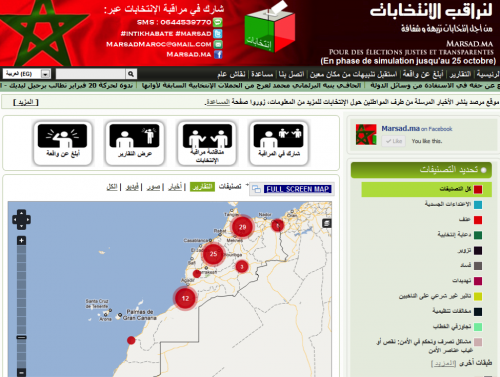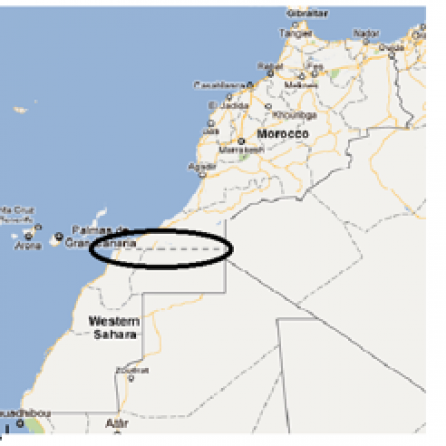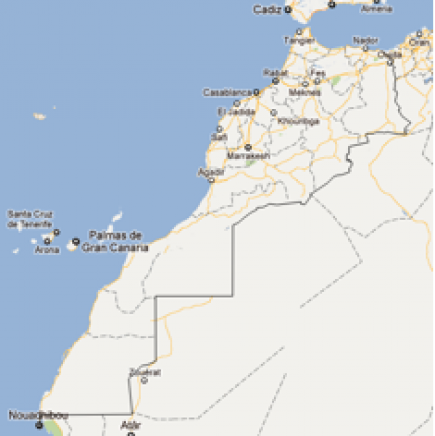Guest post by Tarik Nesh-Nash, Director of Software Centre, Morocco and Founder of Marsad.ma.
Technology is reshaping politics. In Morocco, the Internet is largely used by citizens to claim change, organize manifestations and even debate political reforms. Now, using Ushahidi, Moroccans are participating in election monitoring on Marsad.ma (Marsad, in Arabic, means Observatory).
Marsad.ma follows the lead of other successful international efforts to promote transparency and fight electoral fraud by publishing incidents reported by citizens. The reports are managed by OMDH (Moroccan Human Rights Organization), a leading human rights organization in Morocco with recognized expertise in election monitoring.
 The site went through 30 days of beta testing to collect users’ feedback and train the administrators. It was officially launched one month before the election scheduled for November 25th. Of the lessons that were drawn from the beta phase, I would like to focus on two special issues:
Facebook and Twitter integration: In Morocco, social networks are becoming the agora of political discussions. Marsad.ma paid extra attention to better integrate with them. Reports are automatically published on these social networks and a Facebook based forum is used to engage discussions and attract users. 30% of the site traffic comes from Facebook and Twitter.
Using maps in conflicts sensitive zones: Maps are not politically agnostic. Google Maps (as well as other map providers: Bing, Yahoo, OpenStreetMaps) show a dotted line that separates Morocco from southern part, Sahara. The final solution of the conflict is on the hands of United Nations, and Morocco is de facto exercising the administration and other aspects of sovereignty. Since the site is covering the election monitoring on this region, users reacted very negatively to this map and almost pushed to halt the site. The Marsad.ma team resolved the problem by publishing a new borders layer. While this solution is satisfactory, it will be blocking wide adoption of future geo-mapping sites and Ushahidi in Morocco. Google should probably consider looking into resolving this issue as it has done for other conflict zones.
The site went through 30 days of beta testing to collect users’ feedback and train the administrators. It was officially launched one month before the election scheduled for November 25th. Of the lessons that were drawn from the beta phase, I would like to focus on two special issues:
Facebook and Twitter integration: In Morocco, social networks are becoming the agora of political discussions. Marsad.ma paid extra attention to better integrate with them. Reports are automatically published on these social networks and a Facebook based forum is used to engage discussions and attract users. 30% of the site traffic comes from Facebook and Twitter.
Using maps in conflicts sensitive zones: Maps are not politically agnostic. Google Maps (as well as other map providers: Bing, Yahoo, OpenStreetMaps) show a dotted line that separates Morocco from southern part, Sahara. The final solution of the conflict is on the hands of United Nations, and Morocco is de facto exercising the administration and other aspects of sovereignty. Since the site is covering the election monitoring on this region, users reacted very negatively to this map and almost pushed to halt the site. The Marsad.ma team resolved the problem by publishing a new borders layer. While this solution is satisfactory, it will be blocking wide adoption of future geo-mapping sites and Ushahidi in Morocco. Google should probably consider looking into resolving this issue as it has done for other conflict zones.
Map of Morocco in Maps.google

Moroccan map as shown in Marsad.ma
 Moving forward, the Marsad.ma team is looking towards succeeding in the election monitoring then preparing new platforms using Ushahidi. It is investigating the following challenges:
Validation: The problem of report validation remains a classical concern. A meeting is organized by ICT4Peace and scheduled on the ICCM conference 2011 in Geneva to exchange ideas and plans on this topic.
Workflow automation: Each problem space is unique and requires different treatment. For instance, crisis response reports are managed differently from election monitoring reports. The team is looking into ways to separate the technical knowledge from the internal functional/political decision making. A model is being investigated to automate this workflow.
While it is too early to assess the usefulness of Marsad.ma, it has already created a buzz among users and media. Yet, its success can only be measured after the elections.
A final “thank you note” needs to go to the supportive Ushahidi community, particularly Marta Poblet and Pompeu Casanovas (IDT , Spain), Mark Belinksy (Digital Democracy, US), Daniel Stauffacher (ICT4Peace, Switzerland), Kamal Sedra (DISC, Egypt) and the international Crisismappers community.
About Tarik:
Tarik Nesh-Nash, director of Software Centre, a Moroccan software R&D startup, is a social entrepreneur and a democracy activist. He worked as a manager at Microsoft R&D in Redmond and Beijing, and as a protection delegate in Iraq at the International Committee of the Red Cross.
He is a member of the national council of the Moroccan Human Rights Organization (OMDH), and has participated on volunteering on Red Cross activities in Spain and Morocco.
He has a master’s degree in Computer Sciences from the University of Washington and is pursuing a law degree in Morocco.
He is the cofounder of www.reforme.ma, a platform for crowdsourcing debate about the reform of the Moroccan constitution, and founded www.juriste.ma a portal of Moroccan law related documentation to promote free access to legal information.
Currently, he is particularly interested on applying technology to concepts related to participatory democracy.
Moving forward, the Marsad.ma team is looking towards succeeding in the election monitoring then preparing new platforms using Ushahidi. It is investigating the following challenges:
Validation: The problem of report validation remains a classical concern. A meeting is organized by ICT4Peace and scheduled on the ICCM conference 2011 in Geneva to exchange ideas and plans on this topic.
Workflow automation: Each problem space is unique and requires different treatment. For instance, crisis response reports are managed differently from election monitoring reports. The team is looking into ways to separate the technical knowledge from the internal functional/political decision making. A model is being investigated to automate this workflow.
While it is too early to assess the usefulness of Marsad.ma, it has already created a buzz among users and media. Yet, its success can only be measured after the elections.
A final “thank you note” needs to go to the supportive Ushahidi community, particularly Marta Poblet and Pompeu Casanovas (IDT , Spain), Mark Belinksy (Digital Democracy, US), Daniel Stauffacher (ICT4Peace, Switzerland), Kamal Sedra (DISC, Egypt) and the international Crisismappers community.
About Tarik:
Tarik Nesh-Nash, director of Software Centre, a Moroccan software R&D startup, is a social entrepreneur and a democracy activist. He worked as a manager at Microsoft R&D in Redmond and Beijing, and as a protection delegate in Iraq at the International Committee of the Red Cross.
He is a member of the national council of the Moroccan Human Rights Organization (OMDH), and has participated on volunteering on Red Cross activities in Spain and Morocco.
He has a master’s degree in Computer Sciences from the University of Washington and is pursuing a law degree in Morocco.
He is the cofounder of www.reforme.ma, a platform for crowdsourcing debate about the reform of the Moroccan constitution, and founded www.juriste.ma a portal of Moroccan law related documentation to promote free access to legal information.
Currently, he is particularly interested on applying technology to concepts related to participatory democracy.
 The site went through 30 days of beta testing to collect users’ feedback and train the administrators. It was officially launched one month before the election scheduled for November 25th. Of the lessons that were drawn from the beta phase, I would like to focus on two special issues:
Facebook and Twitter integration: In Morocco, social networks are becoming the agora of political discussions. Marsad.ma paid extra attention to better integrate with them. Reports are automatically published on these social networks and a Facebook based forum is used to engage discussions and attract users. 30% of the site traffic comes from Facebook and Twitter.
Using maps in conflicts sensitive zones: Maps are not politically agnostic. Google Maps (as well as other map providers: Bing, Yahoo, OpenStreetMaps) show a dotted line that separates Morocco from southern part, Sahara. The final solution of the conflict is on the hands of United Nations, and Morocco is de facto exercising the administration and other aspects of sovereignty. Since the site is covering the election monitoring on this region, users reacted very negatively to this map and almost pushed to halt the site. The Marsad.ma team resolved the problem by publishing a new borders layer. While this solution is satisfactory, it will be blocking wide adoption of future geo-mapping sites and Ushahidi in Morocco. Google should probably consider looking into resolving this issue as it has done for other conflict zones.
The site went through 30 days of beta testing to collect users’ feedback and train the administrators. It was officially launched one month before the election scheduled for November 25th. Of the lessons that were drawn from the beta phase, I would like to focus on two special issues:
Facebook and Twitter integration: In Morocco, social networks are becoming the agora of political discussions. Marsad.ma paid extra attention to better integrate with them. Reports are automatically published on these social networks and a Facebook based forum is used to engage discussions and attract users. 30% of the site traffic comes from Facebook and Twitter.
Using maps in conflicts sensitive zones: Maps are not politically agnostic. Google Maps (as well as other map providers: Bing, Yahoo, OpenStreetMaps) show a dotted line that separates Morocco from southern part, Sahara. The final solution of the conflict is on the hands of United Nations, and Morocco is de facto exercising the administration and other aspects of sovereignty. Since the site is covering the election monitoring on this region, users reacted very negatively to this map and almost pushed to halt the site. The Marsad.ma team resolved the problem by publishing a new borders layer. While this solution is satisfactory, it will be blocking wide adoption of future geo-mapping sites and Ushahidi in Morocco. Google should probably consider looking into resolving this issue as it has done for other conflict zones.

 Moving forward, the Marsad.ma team is looking towards succeeding in the election monitoring then preparing new platforms using Ushahidi. It is investigating the following challenges:
Validation: The problem of report validation remains a classical concern. A meeting is organized by ICT4Peace and scheduled on the ICCM conference 2011 in Geneva to exchange ideas and plans on this topic.
Workflow automation: Each problem space is unique and requires different treatment. For instance, crisis response reports are managed differently from election monitoring reports. The team is looking into ways to separate the technical knowledge from the internal functional/political decision making. A model is being investigated to automate this workflow.
While it is too early to assess the usefulness of Marsad.ma, it has already created a buzz among users and media. Yet, its success can only be measured after the elections.
A final “thank you note” needs to go to the supportive Ushahidi community, particularly Marta Poblet and Pompeu Casanovas (IDT , Spain), Mark Belinksy (Digital Democracy, US), Daniel Stauffacher (ICT4Peace, Switzerland), Kamal Sedra (DISC, Egypt) and the international Crisismappers community.
About Tarik:
Tarik Nesh-Nash, director of Software Centre, a Moroccan software R&D startup, is a social entrepreneur and a democracy activist. He worked as a manager at Microsoft R&D in Redmond and Beijing, and as a protection delegate in Iraq at the International Committee of the Red Cross.
He is a member of the national council of the Moroccan Human Rights Organization (OMDH), and has participated on volunteering on Red Cross activities in Spain and Morocco.
He has a master’s degree in Computer Sciences from the University of Washington and is pursuing a law degree in Morocco.
He is the cofounder of www.reforme.ma, a platform for crowdsourcing debate about the reform of the Moroccan constitution, and founded www.juriste.ma a portal of Moroccan law related documentation to promote free access to legal information.
Currently, he is particularly interested on applying technology to concepts related to participatory democracy.
Moving forward, the Marsad.ma team is looking towards succeeding in the election monitoring then preparing new platforms using Ushahidi. It is investigating the following challenges:
Validation: The problem of report validation remains a classical concern. A meeting is organized by ICT4Peace and scheduled on the ICCM conference 2011 in Geneva to exchange ideas and plans on this topic.
Workflow automation: Each problem space is unique and requires different treatment. For instance, crisis response reports are managed differently from election monitoring reports. The team is looking into ways to separate the technical knowledge from the internal functional/political decision making. A model is being investigated to automate this workflow.
While it is too early to assess the usefulness of Marsad.ma, it has already created a buzz among users and media. Yet, its success can only be measured after the elections.
A final “thank you note” needs to go to the supportive Ushahidi community, particularly Marta Poblet and Pompeu Casanovas (IDT , Spain), Mark Belinksy (Digital Democracy, US), Daniel Stauffacher (ICT4Peace, Switzerland), Kamal Sedra (DISC, Egypt) and the international Crisismappers community.
About Tarik:
Tarik Nesh-Nash, director of Software Centre, a Moroccan software R&D startup, is a social entrepreneur and a democracy activist. He worked as a manager at Microsoft R&D in Redmond and Beijing, and as a protection delegate in Iraq at the International Committee of the Red Cross.
He is a member of the national council of the Moroccan Human Rights Organization (OMDH), and has participated on volunteering on Red Cross activities in Spain and Morocco.
He has a master’s degree in Computer Sciences from the University of Washington and is pursuing a law degree in Morocco.
He is the cofounder of www.reforme.ma, a platform for crowdsourcing debate about the reform of the Moroccan constitution, and founded www.juriste.ma a portal of Moroccan law related documentation to promote free access to legal information.
Currently, he is particularly interested on applying technology to concepts related to participatory democracy.